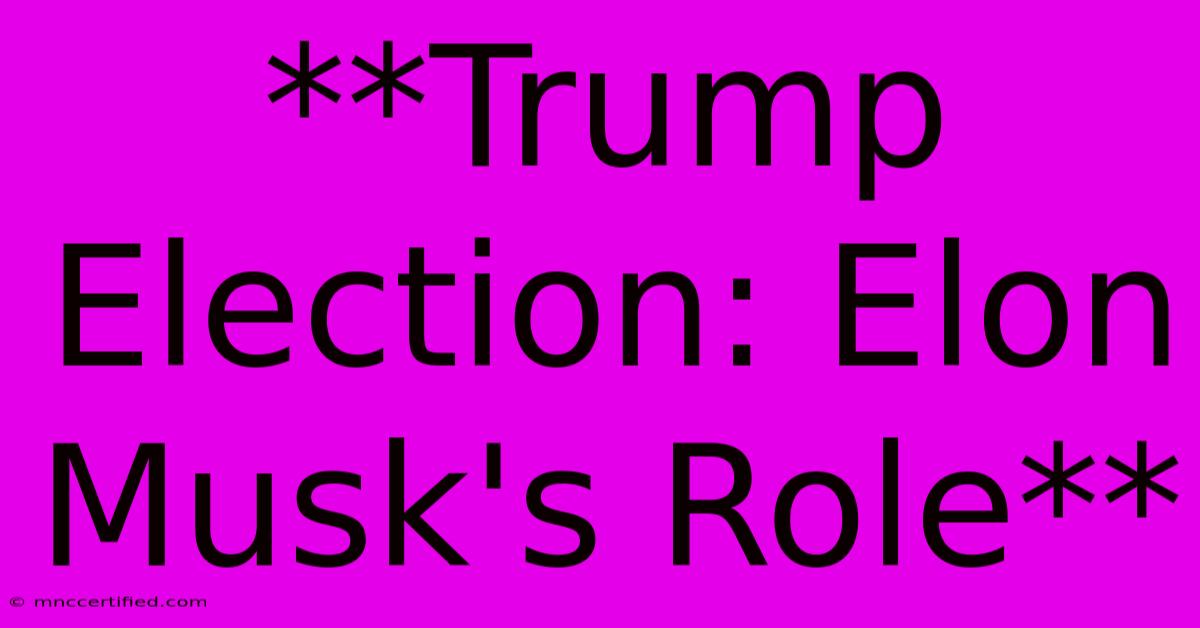**Trump Election: Elon Musk's Role**

Table of Contents
Trump Election: Elon Musk's Role - A Complex Web of Influence
The 2016 US presidential election was a watershed moment in American politics, and its aftermath continues to resonate today. While many factors contributed to Donald Trump's surprising victory, the role of social media, specifically Twitter, and the influence of figures like Elon Musk, have drawn considerable attention.
This article explores the complex relationship between Elon Musk, Twitter, and the 2016 Trump election, analyzing the potential impact of Musk's activities and statements on the political landscape.
Musk and the Rise of Twitter
Elon Musk's involvement with Twitter began long before the 2016 election. His active use of the platform, often employing humor and directness, made him a prominent voice, particularly among technology enthusiasts. He used Twitter to share his views on various topics, including politics, with his growing number of followers.
However, his relationship with Twitter took a dramatic turn in 2022 when he purchased the platform for $44 billion. This acquisition raised questions about the future of political discourse on the platform and Musk's own influence.
Musk's Political Stances and Their Impact
Musk's political views, particularly on issues like free speech and government regulations, often align with conservative ideologies. This stance has led to accusations that he leans towards the right and may support certain political candidates, including Donald Trump.
While he has not publicly endorsed any specific candidates, Musk's public statements and actions have been interpreted by some as supporting Trump and his policies. Notably, Musk has expressed skepticism about climate change, a policy area where Trump's administration took controversial stances.
Twitter as a Political Battlefield
Twitter has become a central hub for political discourse, particularly during election cycles. Its ability to spread information rapidly and widely makes it a potent tool for campaign strategies. The platform's algorithms, which prioritize engagement and virality, can amplify certain messages, potentially influencing public opinion.
In the 2016 election, Twitter was widely used by both Trump and his opponents to communicate their messages, mobilize supporters, and engage in political debate. The platform's role in spreading misinformation and fake news also became a major concern, raising questions about the potential for its misuse in shaping public opinion.
Musk's Influence on Twitter's Algorithm and Political Discourse
Musk's purchase of Twitter has significantly altered the platform's landscape. He has pledged to prioritize free speech, aiming to reduce censorship and increase transparency in content moderation. These changes have generated controversy, with some arguing that they could lead to increased misinformation and polarization.
The extent of Musk's influence on Twitter's algorithm, which determines the content users see, remains uncertain. Critics worry that he might manipulate the platform to favor certain political viewpoints, potentially influencing election outcomes.
The Impact on the 2024 Election
The 2024 election is drawing near, and the role of social media, particularly Twitter under Musk's ownership, is likely to be even more significant. Musk's policies and the evolving nature of political discourse on the platform will undoubtedly play a role in shaping the election landscape.
The potential impact of Musk's decisions on Twitter's algorithm and content moderation, combined with his own public statements, will be closely observed by politicians, media outlets, and the general public.
Conclusion
Elon Musk's involvement with Twitter, culminating in his acquisition of the platform, has created a complex and evolving situation. While it's difficult to quantify his exact influence on the 2016 election, his actions and statements have undoubtedly added a layer of complexity to the political landscape.
His future decisions regarding Twitter's algorithm, content moderation, and his own public statements will continue to be scrutinized as we approach the 2024 election. This evolving scenario raises questions about the role of social media in shaping political discourse and the potential for individuals with significant influence to impact democratic processes.

Thank you for visiting our website wich cover about **Trump Election: Elon Musk's Role**. We hope the information provided has been useful to you. Feel free to contact us if you have any questions or need further assistance. See you next time and dont miss to bookmark.
Featured Posts
-
Bitcoin Price Response To Events During The Recent Recession
Nov 07, 2024
-
Trading In A Car With A Check Engine Light
Nov 07, 2024
-
Trump Wins Walzs Home County In Election
Nov 07, 2024
-
Musk Benefits From Trump Victory
Nov 07, 2024
-
Leeds Vs Millwall Championship Match Odds And Analysis
Nov 07, 2024